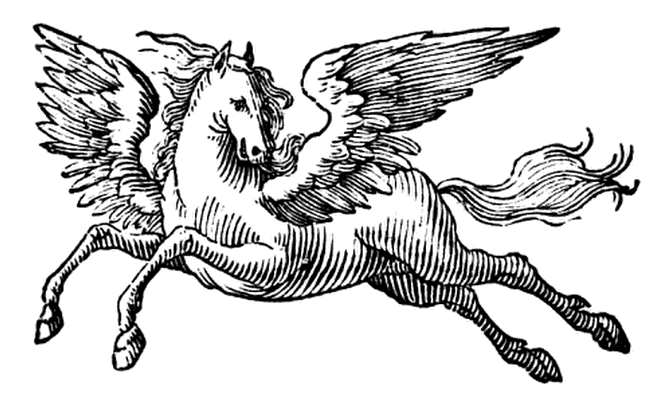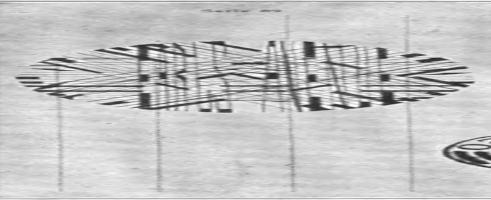
An optical illusion. All the edges in this image are straight, and each is either horizontal, vertical, or at a 45° angle.

An optical illusion. All the edges in this image are straight, and each is either horizontal, vertical, or at a 45° angle.

Naturalists state that snakes, when in danger, have been known to swallow each other; the above three snakes have just commenced to perform this operation. The snakes are from the same ‘hatch,’ and are therefore equal in age, length, weight, &c. They all start at scratch — that is, commence swallowing simultaneously. They are twirling round at the express rate of 300 revolutions per minute, during which time the circumference is decreased by 1 inch.
We would like our readers to tell us what will be the final result? Heads or tails, and how many of each?
— John Scott, The Puzzle King, 1899

Suppose now that two philosophers, McX and I, differ over ontology. Suppose McX maintains there is something which I maintain there is not. McX can, quite consistently with his own point of view, describe our difference of opinion by saying that I refuse to recognize certain entities. …
When I try to formulate our difference of opinion, on the other hand, I seem to be in a predicament. I cannot admit that there are some things which McX countenances and I do not, for in admitting that there are such things I should be contradicting my own rejection of them.
It would appear, if this reasoning were sound, that in any ontological dispute the proponent of the negative side suffers the disadvantage of not being able to admit that his opponent disagrees with him.
This is the old Platonic riddle of nonbeing. Nonbeing must in some sense be, otherwise what is it that there is not?
— Willard Van Orman Quine, “On What There Is,” 1948
‘I send you a post card which was delivered safely the day after it was posted. I think the address reflects credit on both the ingenuity of the sender and the cleverness of the Post Office officials.’ — A Folkestone Correspondent
(From Strand, December 1903.) (Click to enlarge.)
UPDATE: A number of readers have asked for the solution. The Strand gives none, and perhaps had none, but a diligent postal worker who viewed the envelope edge-on would have discovered that the circle is composed of four overlapping sets of letters, offset from one another by 45 degrees and each so tall and narrow as to be otherwise unreadable. When they’re viewed at an angle, perspective condenses the letters into four phrases:




By my best reading, the address is C.H. BRUCE, ESQR, EARLS AVENUE, FOLKESTONE, ENGLAND.
Given names of the 11 children of Mr. and Mrs. Ernest Russell of Vinton, Ohio, 1972:
“Mother did it, but I don’t know why,” Laur told UPI. “She would take names from the Bible and other books and compare them until they came out that way.”
Bonus palindrome item: Volume 1, Issue 5 of Alan Moore’s graphic novel Watchmen, titled “Fearful Symmetry,” is a deliberately contrived visual palindrome, not just in structure but often within individual panels (designed by artist Dave Gibbons). Pedro Ribeiro shows the correspondences here.

For more than half a millennium, between the 12th century and the 19th, an enormous log jam clogged the Red River in the Southern United States. By the early 1830s, it stretched more than 160 miles, with new logs and vegetation accreting at its upper end while older material decayed and washed out at the lower.
By the start of the 19th century the mass was blocking settlement in the area west of Shreveport, so the U.S. Army Corps of Engineers hired steamboat entrepreneur Henry Miller Shreve, who spent nine years clearing a navigable path using specially designed “snag boats.”
A grateful public named the city of Shreveport after him, but a second raft soon began to form upstream, extending eventually as far as the Arkansas state line. That would have to be removed as well.
(Thanks, Kevin.)
‘The letters in this curious alphabet are all wood, chiefly twisted roots of the blue gum, and have not been altered in any way from their original growth; three girls collected them in their daily walks or rides for a period of six months, and the specimens were found in various places; frequently one was carried home on horseback for many miles. All are about two feet high. The “B” was the last found, and when the young ladies had almost despaired of ever getting one it was found in a heap of driftwood caught against a tree in the river.’ — Miss Cave, Vergemont, Clontreagh, Co. Dublin
— Strand, December 1902

On New Year’s Eve 1914, an enormous wave struck the lighthouse on Trinidad Head outside Trinidad, California:
At 4:40 p. m. I observed a sea of unusual height. When it struck the bluff the jar was very heavy. The lens immediately stopped revolving. The sea shot up the face of the bluff and over it, until the solid sea seemed to me to be on a level with where I stood in the lantern. The sea itself fell over onto the top of the bluff and struck the tower about on a level with the balcony. The whole point between the tower and the bluff was buried in water.
If keeper Fred L. Harrington’s report is accurate, this was the highest recorded ocean wave ever to have struck the west coast of the United States. The lighthouse stood on a bluff 175 feet high, and the wave had managed to extinguish the light at its top, 196 feet above the sea.
For a fictional character, Sherlock Holmes has a strangely real presence in the physical world. This plaque is posted near the Reichenbach Falls in Switzerland:

This one’s on a cottage in Sussex:

There’s even a plaque at the spot where Holmes met Watson.
Naturalist Gilbert White, author of Natural History and Antiquities of Selborne, seems to have had an imaginary contemporary nemesis. Someone has posted this plaque on the house opposite White’s 18th-century Hampshire home:

(Black is the opposite of white, and Sullivan is the opposite, or at least the complement, of Gilbert.)
Finally, this plaque adorns the Park Street Eye Clinic in Tauranga, New Zealand:

Accurate enough.
(Thanks to readers Tom Race, Brieuc de Grangechamps, and Derek Christie.)
I think I mentioned this on the podcast at some point: One summer morning in 1815, proprietor William Butterfield opened the White Wells at Ilkley, West Yorkshire, to a sound of whirring:
All over the water and dipping into it was a lot of little creatures, all dressed in green from head to foot, none of them more than eighteen inches high, and making a chatter and jabber thoroughly unintelligible. They seemed to be taking a bath, only they bathed with all their clothes on.
Soon, however, one or two of them began to make off, bounding over the walls like squirrels. Finding they were all making ready for decamping, and wanting to have a word with them, he shouted at the top of his voice — indeed, he declared afterwards, he couldn’t find anything else to say or do — ‘Hallo there!’ Then away the whole tribe went, helter skelter, toppling and tumbling, heads over heels, heels over heads, and all the while making a noise not unlike a disturbed nest of young partridges.
That’s the account recorded by Charles C. Smith in the Folk-Lore Record of 1878. Butterfield had died in 1844, but Smith had the story from his associate John Dobson, who described the bathman as “a good sort of a man, honest, truthful, and steady, and as respectable a fellow as you could find here and there.” The fairies made no comment.